Hey sports fans! It’s that time of the year again, when everyone’s putting together fantasy football leagues, starting to get excited about baseball playoffs, not really paying much attention to basketball stuff, and continuing to ignore the fact that jai alai is the game of a thousand thrills.
While more well-covered sports have a fair share of iconic movies that you don’t even have to be a sports fan to know, like basketball (HOOSIERS), football (THE LONGEST YARD), golf (CADDYSHACK) or baseball (MAJOR LEAGUE: BACK TO THE MINORS), other sports aren’t as lucky. With that in mind, we’d like to give a dozen alternative viewing options featuring sports that don’t get as much of the cinematic attention. Ranked in order of my fascination with them, below are the twelve most ridiculous forgotten sports movies!
Before you ask, no, GYMKATA is not on the list, as its cult following makes the world’s greatest gymnastics action film ineligible as a “forgotten” film. Sorry, them’s the arbitrary rules, and as I learned from STICK IT, they don’t call it gym-NICE-tics.
(You’ll also note that these are “forgotten,” in the sense that they’re now culturally obscure, as none of these films have more than a thousand votes on IMDb. I wouldn’t be so bold as to call them “12 Sports Films You’ve Never Heard Of,” because I don’t know you, and any site using such a headline may be better off not talking down to their audiences by assuming lack of knowledge. At least throw in the word “probably.” Just saying.)
12. RACQUET (1979)
TENNIS
Tennis has been the central focus for a number of films, including biopics (SECOND SERVE, WHEN BILLIE BEAT BOBBIE) and romantic dramas (WIMBLETON, PLAYERS) but none of them come close to the blinding stupidity of RACQUET. Released in 1979 in the same month as the Ali McGraw-starring PLAYERS and oddly marketed as “The First Major Motion Picture About The World Of Tennis” with faux Jack Davis poster art, RACQUET wants to be the SHAMPOO of tennis, but just manages to be the real poo of sports films.
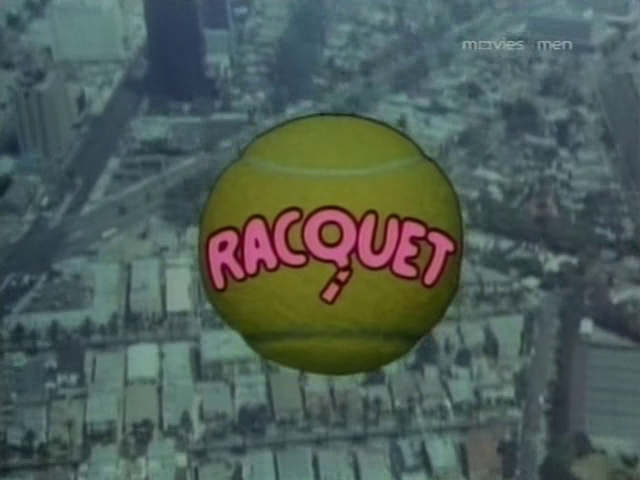
RACQUET miscasts game show host Bert Convy as Tommy, an attractive man. Tommy is also a former tennis pro reduced to being a tennis instructor at a Beverly Hills club who wants to start his own club, and judgmental realtor Susan Tyrrell shows him a great location with a tennis court and a great view of “Alfred Hitchcock’s servant’s quarters.” Sadly, he doesn’t have the 200 grand to put up a deposit and his chipper boss (real-life tennis pro Bobby Riggs) is unlikely to help.
Fortunately, one of his “clients” is a role-playing crazed housewife (Edie Adams) with whom Convy plays “bionic pecker,” and who promises to get the money from her husband, a turkey and limburger cheese fetishist played by Phil Silvers.
Yes, that was an English sentence, and that is a picture from RACQUET, which should give you an idea as to what you’re in for.

Directed by choreographer-turned-Action-International-Pictures-head David Winters, RACQUET is essentially a tennis sex comedy with minimal sex and virtually no tennis or comedy, save for a late-in-the-film “celebrity open” in which Tommy performs valiantly in a match against Bjorn Borg. Much of the film switches between the bawdy, Tom Jones-esque sex hijinx of Tommy and the ridiculously saccharine relationship between Tommy and old flame Monica (Lynda Day George) as they take walks on the beach, ride horses on the beach, and eat chicken on the beach, all via musical montage.
Along the way, we get Tanya Roberts as Tommy’s roommate, Bruce Kimmel as her date, a flamboyantly gay hairstylist played by musician Monti Rock III, and Tommy getting held up by two black guys and defending himself by saying, “I’m a soul brother! I speak your language! Way out! Mother fucker!” Sadly, this does not result in his death.
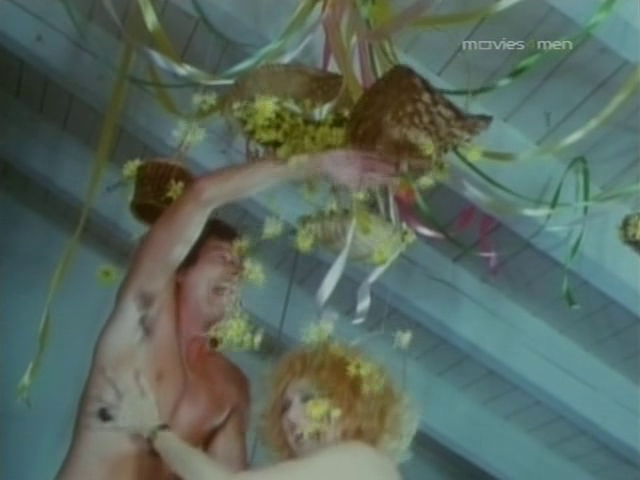
Mike Sullivan wrote about this fine piece of work in Shock Cinema #42, and William Wilson wrote a great write-up of the film here, including an article that mentions how Convy had turned down an earlier version of the film that was too bawdy. Judging from the amount of idiotic sexual humor in the finished film, I can only assume this started out as porn that slowly just had all of the sex scenes cut out. At least I can thank someone for that.
11. SPIKER (1986)
VOLLEYBALL
Volleyball has a surprisingly robust tradition in film, even discounting the nudist camp flicks that used the sport so often that it became a cliché. It’s even served as the focus for a few titles, most notably the Peter Horton-starring comedy SIDE OUT that became a cable staple in the early ‘90s. None of them, however, really “broke through” and caused volleyball to be much more than a curiosity, and an excuse to show a lot of footage of actors in skimpy outfits and occasionally being attacked by zombies.
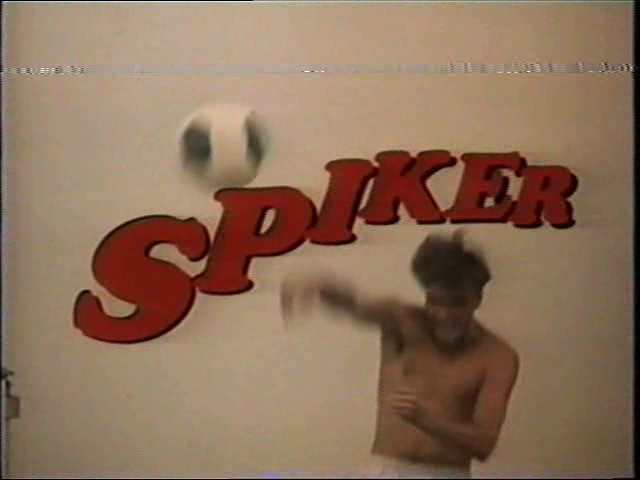
The same year that Tom Cruise romanced Val Kilmer on the volleyball court in TOP GUN, independent filmmaker Roger Tilton made SPIKER, a sincere drama about three men training for the Olympic volleyball team. Released right in between the 1984 and 1988 games, when nobody was thinking about the Olympics at all, the movie vanished without a trace save for a VHS release on Lightning Video that seems to have been mostly ignored by purchasers at video stores across the nation.
The film itself is fairly unremarkable, and the characters fit neatly into archetypes despite the efforts of decent performances. Patrick Houser, right after playing a supporting role in the sports-themed HOT DOG… THE MOVIE, plays the bland lead who romances a reporter, Stephen W. Burns plays the “bad boy” who can’t maintain his dignity (or clothing), and Christopher Allport (who notably played Pete Campbell’s father on “Mad Men” before his death in 2008) is the veteran whose relationship with his wife (one-time Marilyn Munster Jo McDonnell) is on the rocks. It’s all standard stuff, and it’s this drama that fills a majority of the film’s 105-minute running time.
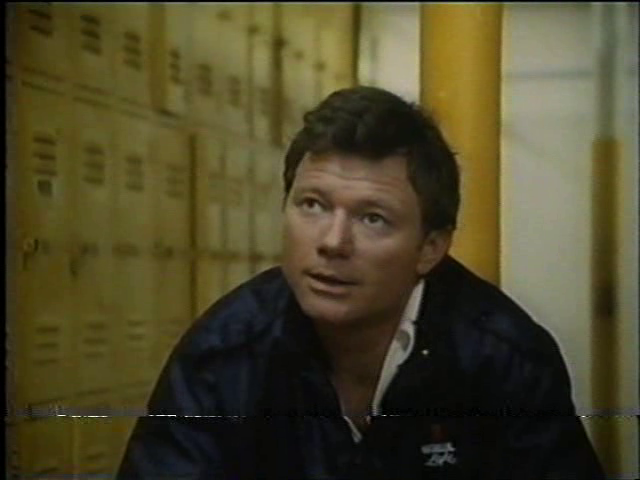
There’s also plenty of volleyball training care of a “tough love” coach played by – Michael Parks! Yes, the best part of SPIKER is the casting of character vet Parks, who lends some gravitas to the unexceptional proceedings. The volleyball scenes themselves are fairly well done and often filled with goofy ‘80s slo-mo, to the point where it’s a shame there aren’t more of them, but you’d probably have to be really into the sport in order to have any real emotional involvement with the characters.
For all of its blandness, SPIKER’s certainly not a bad little movie, and there’s even some odd cold war intrigue introduced almost randomly two-thirds of the way through, as though the writers just thought things were getting too dull. Even if you’re not into volleyball, SPIKER is so standard that it’s comfortable, the sport movie equivalent of curling up in the fetal position. It can even be sort of forgiven that the film ends before we find out how well the team does in their final match.
10. GOLDENGIRL (1970)
SPRINTING
Joseph Sargent’s GOLDENGIRL is an unfortunate movie. While there have been a fair share of films about runners before or since (remember the mid-‘90s, when we had two different movies about Steve Prefontaine to ignore?), GOLDENGIRL was specifically tied to the 1980 Olympic Games, setting its climax at the Moscow event that, as it turned out, the United States boycotted. This was especially bad news for one of the film’s financers, NBC, who had hoped that the network TV premiere would earn big ratings, especially as they’d also had the rights to airing the games themselves. Between the Olympics and “Supertrain,” NBC barely managed to make it into the ‘80s intact.
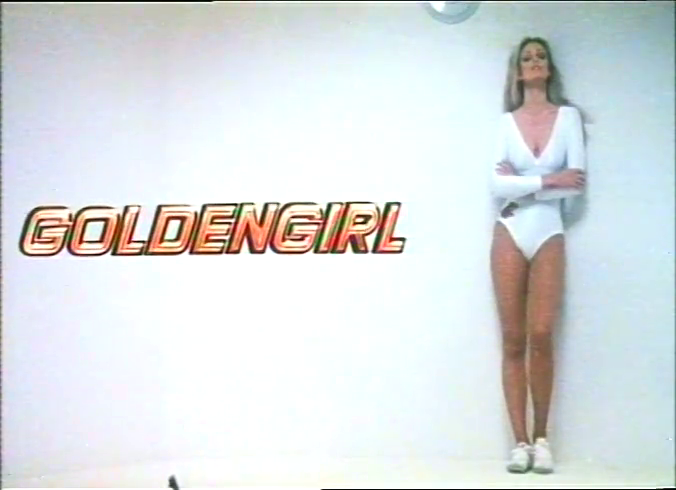
Unfortunately, GOLDENGIRL essentially vanished into obscurity, taking star Susan Anton, a talented and attractive actress and singer, with it. Hopes that the young performer would carry the film financially didn’t pan out, even with the help of a newcomer’s Golden Globe and the presence of James Coburn as a co-star. The film has yet to reach DVD, and it’s a shame, as it’s actually a fairly entertaining dramatic thriller that plays like a mix of LOOKER, THE BOYS FROM BRAZIL and PERSONAL BEST, and Anton does a fine job.
Anton plays Goldine Serafin, a young woman on the road to track stardom, in an effort to win three gold medals in the 1980 Olympics. Her adoptive father (Curd Jürgens, playing his German accent to the hilt) and three of his business cohorts (including Michael Lerner) hire top agent Jack Dryden (Coburn) to represent her, and he promises $20 million in merchandising deals if she manages to win the trifecta.
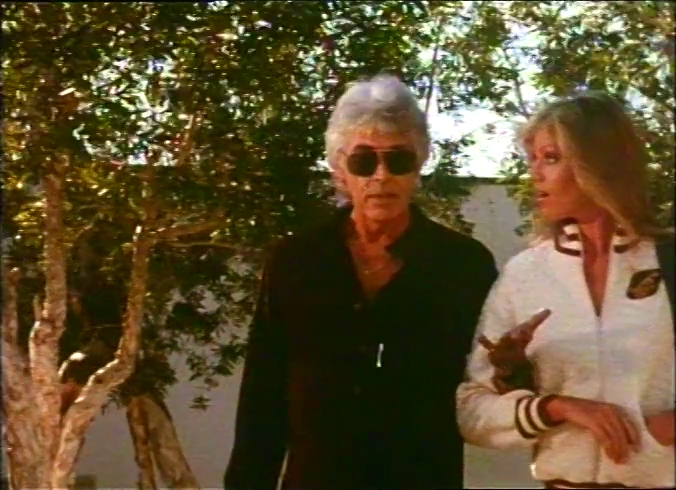
Dryden appreciates Goldine, or “Goldengirl,” as someone who has been well-trained to handle the media attention, though he soon discovers that she’s been genetically enhanced as well, thanks to her science-minded doctor father and a scientist played by Leslie Caron. The doc turns out to be a bit of a mad doc, and is soon becomes a battle of what’s more important in his life; the money he stands to make, his daughter’s love, or his scientific research. Robert Culp plays a reporter that starts nosing around.
While GOLDENGIRL is notable for touching on certain Nazi-based aspects of genetics (the words “master race” are thrown around in one scene), director Sargent and writer John Kohn (1965’s THE COLLECTOR) gloss over much of the creepier aspects of the concept and instead focus on the more realistic ones. Even without the weird eugenics at play, GOLDENGIRL would still be an interesting story about the pressure some parents put on their athletic kids, the drive that some athletes have, and the importance of hitting your marks in the media machine.
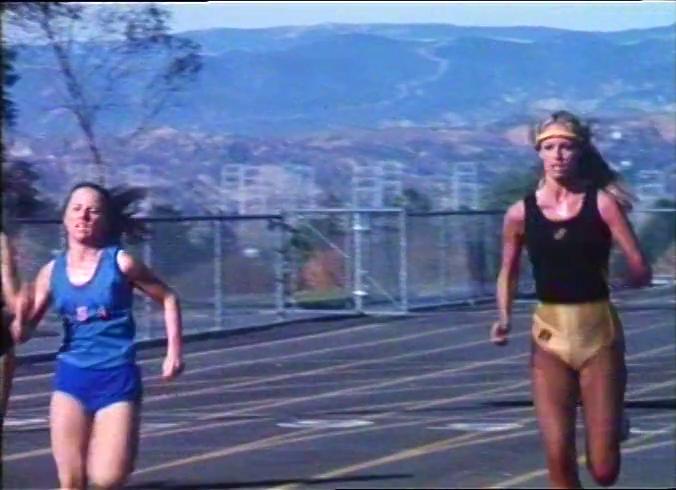
One of the opening sequences, in which Goldine responds to questions to a test press conference with answers that sound so perfectly rehearsed it’s frightening, is captivating stuff, and even if GOLDENGIRL ends up going off in too many directions without adequately exploring all of them, it’s still work a look. It also has the distinction of being the only film with a training sequence backed by music being sung by the actor in the training sequence, as Anton provides the track “Slow Down, I’ll Find You,” written by Bill Conti, who also wrote the music for….
9. DREAMER (1979)
BOWLING
Cue up the Supertramp and sing along with me. “Dreeeee-mer. Tim Matheson plays Dreamer. But can he roll the ball down the lane? Oh, no!”
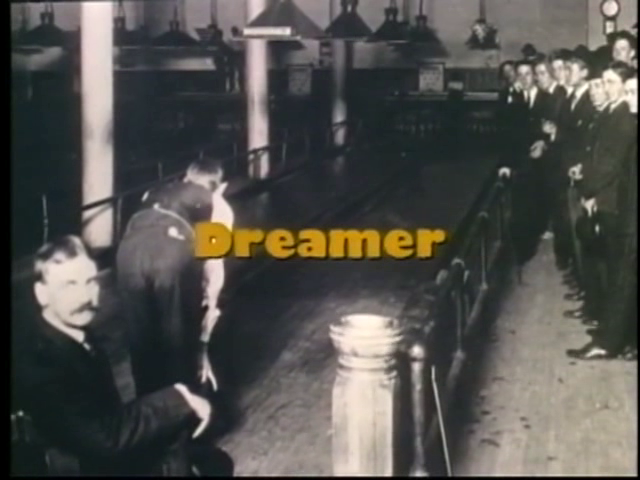
Dreamer’s problem is that he tries to go against the other players rather than the pins, at least according to his mentor, an aging manager played by Jack Warden. (No, “Dreamer” is not his real name, but rather a nickname given to him because he blandly stares into space a lot.) Our hero spends his days working in the local bowling alley run by surly Richard Schull and romancing co-worker Susan Blakely, but he dreams of one day joining the PBA, or the Professional Bowler’s Association.
Basically, DREAMER is ROCKY, but with bowling, and it hits just about every cliché on its way to the national championships, where Dreamer faces off against Dick Weber, an actual bowling great. (I have no idea who Weber is, but the IMDb comments seemed very excited about his presence, and the same goes for ABC commentator Chris Schenkel, who also appears.) Are there disappointments? Training montages? Relationship dramas? Medical issues for Mickey Jack Warden? Yes, yes, yes, and most certainly yes.
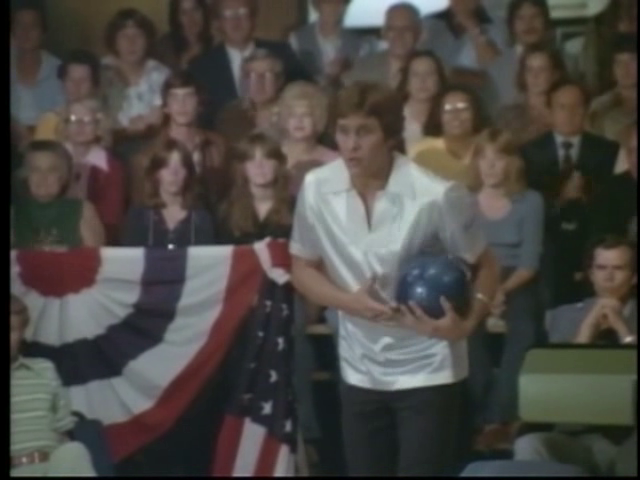
Directed by Noel Nosseck, who got his start at Crown Pictures with BEST FRIENDS and LAS VEGAS LADY, and who shot this before becoming an insanely prolific helmer of made-for-TV movies (include the great FULL EXPOSURE: THE SEX TAPES SCANDAL and the John Carpenter-co-scripted killer snake pick SILENT PREDATORS), DREAMER relies almost entirely on its offbeat concept and the performances of its actors to bring anything new to the table. Thankfully, the cast is solid, and even the minor characters, like Barbara Stuart’s waitress, a pool hustler (Playmate Azizi Johari), and, ugh, a pair of Hispanic pin boys named “Juan” and “Too” played by Pedro Gonzalez Gonzalez and Speedy Zapata, are at least memorable.
Released briefly to theaters in May of 1979, released just as quietly to video via Magnetic Home Video, the film has only been seen on sporadic cable airings (mostly on the Fox Movie Channel) ever since. One YouTube commenter on the trailer above called it a “cult classic,” which seems unlikely for something that’s got all of 114 votes on IMDb, but it’s possible that it’s big on the bowling bootleg circuit somewhere, as pin freaks all across the country quietly hand over raggedy copies of the film on VHS tapes from ball bag to ball bag.
One can dream, anyway. As the trailer above states: A man dreams of winning. A woman dreams of loving. A dreamer dreams of both.
8. THE FIREBALL (1950)
ROLLER DERBY
There are certainly a number of good roller derby films – UNHOLY ROLLERS, KANSAS CITY BOMBER, Drew Barrymore’s recent WHIP IT – but films about male roller derby champions are few and far between, at least those that don’t take place in the future. THE FIREBALL is one of the few “present-day” set films, though the “present day” of this particular flick is 1950, making it the earliest film on our list.
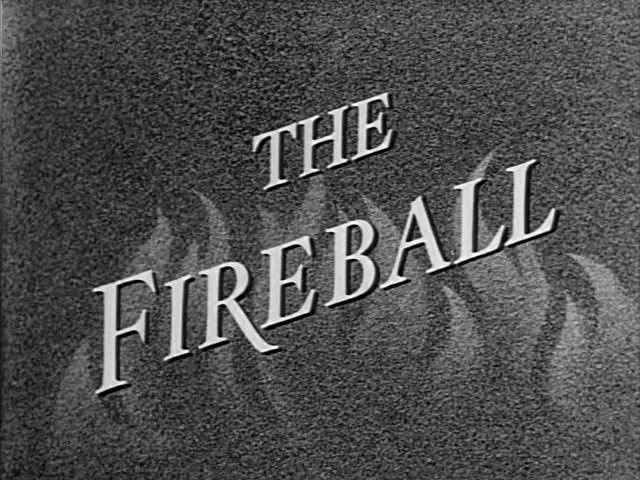
Mickey Rooney stars in this allegedly true story (though I can’t find much to back that up) of Johnny Cesar, a roller derby champion. An orphan, Johnny runs away from his orphanage (which is good, as Rooney was pushing 30 at the time) and finds a pair of roller skates. When a local shopkeeper notices his lack of ability with them, he suggests he take free lessons down at the local rink where he begins to find his true destiny.
Attending a local roller derby bout with his attractive trainer (Beverly Tyler), Johnny heckles enough mocking epithets at the reigning champion to get the attention of the press, who declare “COCKY CHARACTER RIOTS ROLLER SPEEDWAY” in their headlines. As apparently the way roller derby culture works is that you just pick the loudest, most obnoxious asshole of a crowd to become a star, there’s soon a series of highly-attended races between Johnny and the champ.
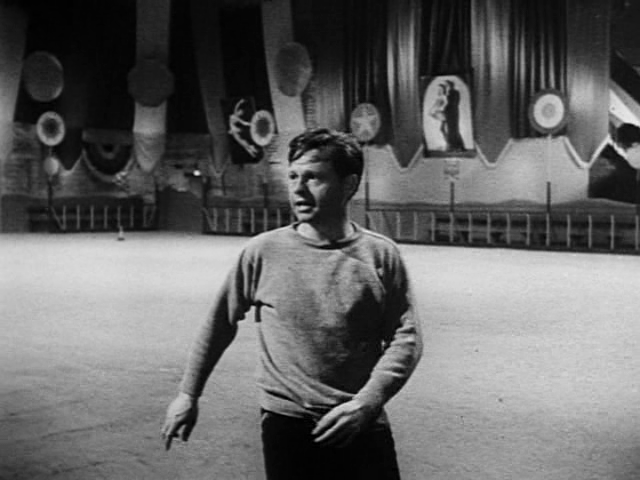
Eventually, Johnny joins a team, wearing what looks ike a little piece of toilet paper attached to his helmet as “showmanship”, becomes “Athlete of the Year” and appears on the cover of Newsweek. Success goes to his head, and he begins acting like an arrogant jerk to everyone and throwing over his nice, supporting partner for a sexier dame (Marilyn Monroe!), even nearly date-raping the partner when she tries to tell him to be less of a snob. His team does well, but none of his teammates like him, as he never lets anyone else score points.
Finally, he gets polio, taking him out of the game, and leading him to re-examine his life. After months(?) of rehabilitation, he finally makes his way back to the track, but will he be a changed man? Or will he have the same attitude that, well, got him fame in the first place?
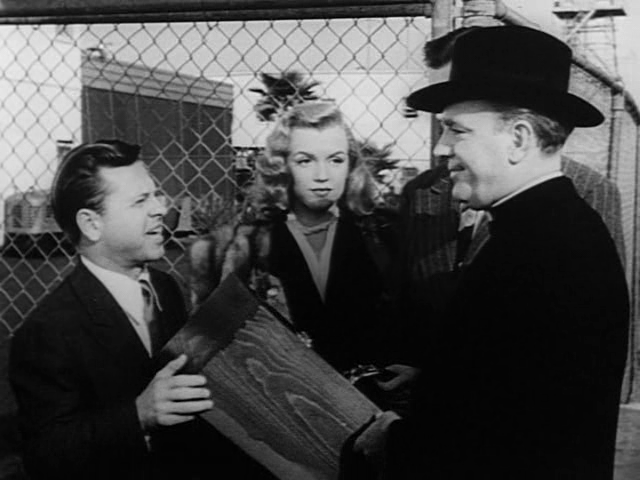
Oddly, the film is narrated by both Johnny and the priest who runs the orphanage and occasionally acts as a mentor figure, played by Pat O’Brien, and between the two we get an overload of inspiration and messages. An the script, written by director Tay Garnett (THE POSTMAN ALWAYS RINGS TWICE) and Horace McCoy (of the better competitors-going-around-in-circles-as-allegory THEY SHOOT HORSES, DON’T THEY?), is more focused on telling a story about redemption than making much in the way of narrative sense.
Even this redemptive story isn’t all that inspiring, as Johnny’s just kind of a jerk through so much of the picture you begin to wonder if his parents just couldn’t stand the kid. Rooney’s a fine actor, and he’s charismatic to pull off the performance, but eventually you’re just rooting for everyone else in his life to forcibly push him over the guardrails, into the stands where the floor has mysteriously been covered with thumbtacks.
7. BILLY THE KID AND THE GREEN BAIZE VAMPIRE (1986)
SNOOKER
Snooker isn’t that unlikely a sport to be the basis for a movie. It’s not common in the United States, but it does have a following. It looks like pool, but it’s got points, and different balls, and… okay, I have no idea how to explain snooker. It’s like pool, but not.
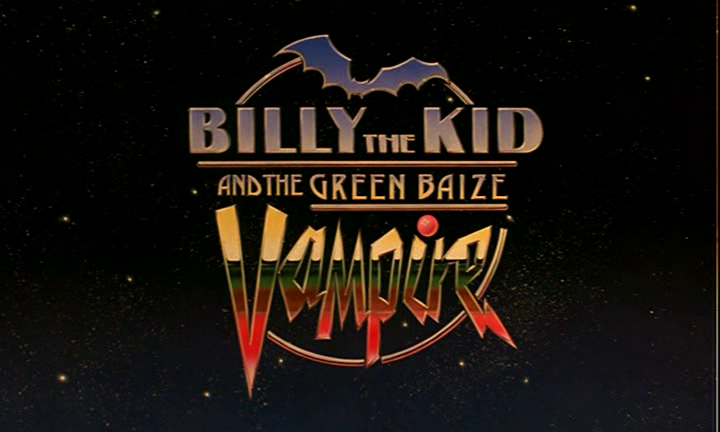
But BILLY THE KID AND THE GREEN BAIZE VAMPIRE is no ordinary snooker film. For one thing, it’s called BILLY THE KID AND THE GREEN BAIZE VAMPIRE, and it is neither a western nor a horror film. For another, it’s one of the last films of British director Alan Clarke, whose excellent made-for-television SCUM and MADE IN BRITAIN are impressive works of intensity. And lastly, it’s a musical.
Shot on a very low budget in what appears to be a previously-unoccupied warehouse or two, BTKATGBV stars SCUM’s Phil Daniels as a hotshot young snooker player who’s used by most of his friends and family for his “green stamps.” Among his friends is The One, played by HOWLING VI’s chief vampire Bruce Payne, a manager who managed to get Billy where he is today.
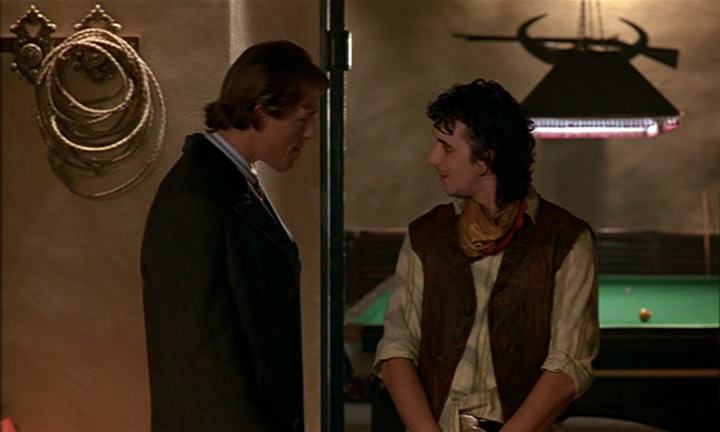
The One gets in trouble with gambling debts, and a sneering mob boss (“If you was an undertaker, people’d stop dying.”) forced to set up Billy to go up against the current snooker champion, a mysterious rich weirdo known as the Green Baize Vampire (Alun Armstrong). (He is, entertainingly, introduced coming out of a coffin with fangs, but this just turns out to be the shooting of a breath freshener commercial.) The two agree to one match, with the terms that whoever loses will never play snooker again.
Shot in day-glo colors that lend a little bit of style to the proceedings, BTKATBV unfortunately can’t overcome a look of cheapness, and while none of the songs are bad, none of them are particularly memorable. An operatic number featuring the “vampire” and his wife about how he bites back is solid, and the film is distinctive in that it actually features a training montage in which the supporting cast sings “Practice, practice, practice” in the background.
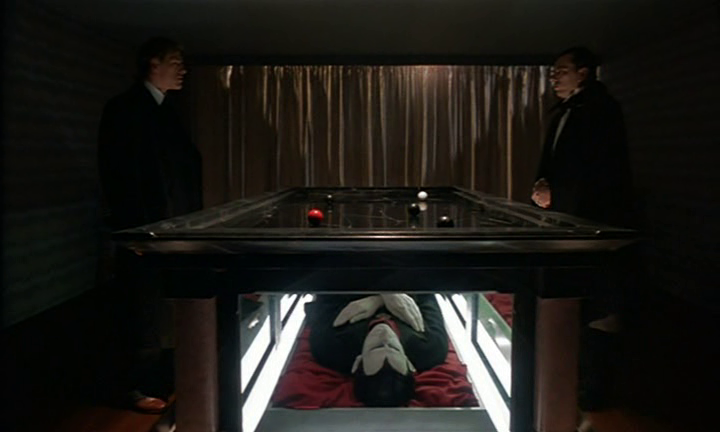
BTKATGBV isn’t by any means a great film, and it lacks the intensity of Clarke’s more notable works, but it’s still an entertaining cultural curiosity, and it’s never dull. The climactic battle takes a fair share of screen time, so snooker fans might be even more entertained, but a snooker neophyte myself was just struggling to figure out what was supposed to be happening.
6. FOWL PLAY (1976)
5. ROOSTER: SPURS OF DEATH (1977)
COCKFIGHTING
Most self-respecting film fans are at least aware of COCKFIGHTER, Monte Hellman’s 1974 film starring Warren Oates as a silent cocker on his way to being “Cockfighter of the Year” so he can speak again, based on Charles Willeford’s novel. Hellman’s talents, Oates’ strong performance and a great supporting cast make COCKFIGHTER good enough that you can almost ignore the fact that it’s rooted in a horrific, cruel bloodsport that would never get a film past the ASPCA these days.

When you take out the talent, however, you get something like 1975’s FOWL PLAY, a Troma-acquired Philippines-lensed American-produced pic that also saw release under the title SUPERCOCK. Either title should give you the hint of exactly what you’re in store for in this flick, featuring Ross Hagen and Nancy Kwan, the Bogie and Bacall of low-rent, Asian-lensed, U.S.-backed ‘70s exploitation flicks that sound a lot more entertaining than they are. (NIGHT CREATURE or WONDER WOMEN, anyone?) It’s also the second film of the generally underrated Gus Trikonis (THE EVIL, the TV-movie faux-giallo SHE’S DRESSED TO KILL), but most of SUPERCOCK’s entertainment value comes solely from its’ ineptitude.
Character vet Hagen plays an Oregon cowboy who comes to the Philippines for a big-money cockfight with his prized chicken Friendly, making his way through customs by responding, “Just my cock” when asked if he has anything to declare. That’s the sort of humor that runs entirely though the film – nobody in he cast seems to take anything seriously, and you can almost see the eleven-year-olds within gigging every time someone says “cock.” Which is a lot, often in oddly-structured sentences that don’t even make sense.
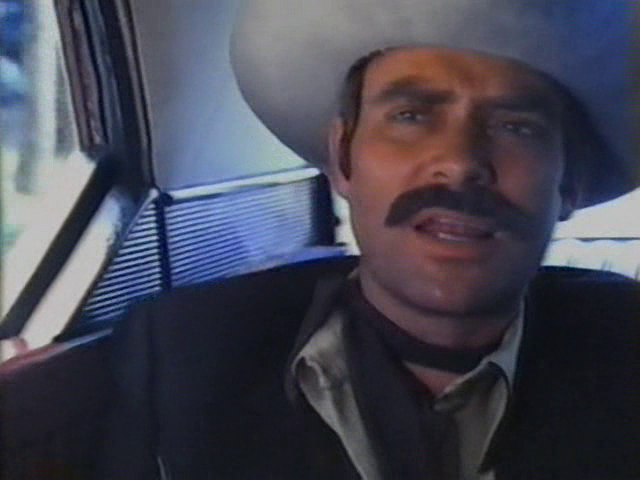
Hagen, who as a “barbarian cowboy” just resembles Richard Benjamin in WESTWORLD, is looked at suspiciously by the three brothers that run the show, though only the chubbiest one speaks. (Mostly the word “cock” in oddly-structured sentences.) They send off their secretary (Kwan), but she ends up falling or the guy, and kidnappings, shootings, and twists ensue before the big match.
While the whole thing isn’t taken seriously, actual occasional comic relief is provided by a cabbie tha Hagen befriends with the unlikely nickname of G.I. Joe, played by Tony Lorea. His escapades in helping Hagen by gathering a bunch of local children to do various hijinx are at least watchable, especially a bizarrely long sequence in which he and Hagen giggle hysterically while shooting watermelons. Perhaps they needed to get out all of those giggles from thinking about cock so much.
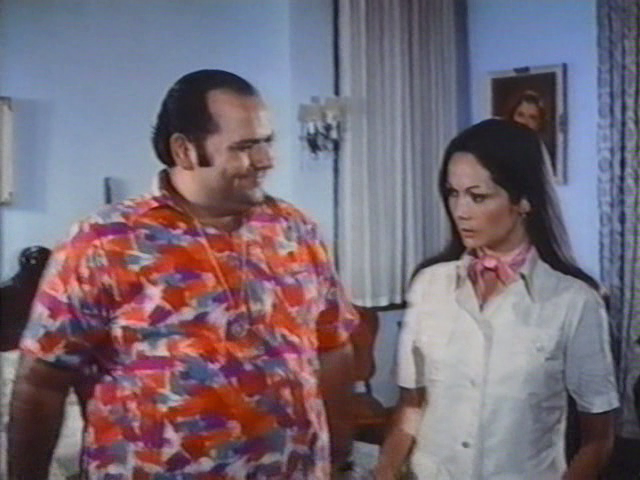
There’s some half-assed attempt to justify the sport by calling it a man’s game that allows them to learn about manliness or something (seriously, if you’re going to do a cock joke, do it here) but there’s actually very little of the sport depicted. Even in the finale, when we do get some genuine cockfighting (which is awful), most of the footage is repeated shots of the crowd yelling. There’s also a chase sequence featuring horse-drawn buggies.
While the biggest surprise in SUPERCOCK is the lack of Vic Diaz, 1977’s ROOSTER: SPURS OF DEATH (not released until 1983 found it on negligible video label World Video) hits you right from the opening with a heavy narration about how cockfighting is historically important and part of an ancient sport, one partaken in by “the same hands that would sign the Constitution.” Then we even get a theme song about roosters that fight, embracing their business of courage. Incredible!
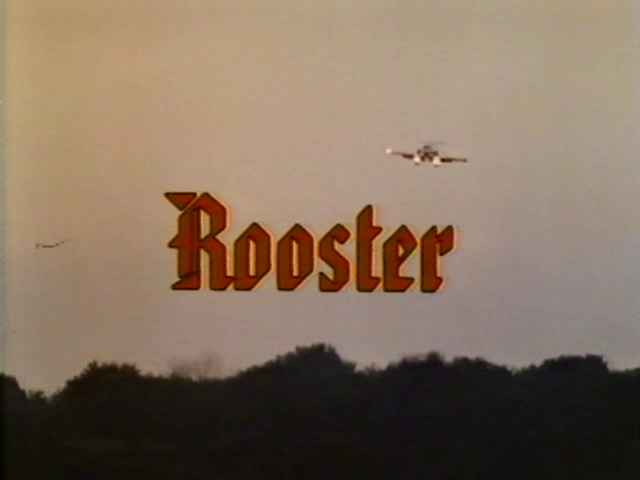
The film itself is more a strange melodrama with cockfighting attached, an odd choice for the final directorial effort of Disney artist Bruce Mack, who also made the AIP CARRIE rip-off JENNIFER and the T&A flick SWAP MEAT. ROOSTER, then, is a practiced, polished affair with solid character actors, which makes it all the more strange when it goes off the rails.
The film follows a pre-ROCK’N’ROLL HIGH SCHOOL Vincent Van Patten as a kid whose father has been training him in the ways of the sport of cockfighting, much to the chagrin of his mother (Ruta Lee). The relationship between the parents is volatile, despite dad’s charming mention that, “You’re just an egg layer! You’re my hen!”
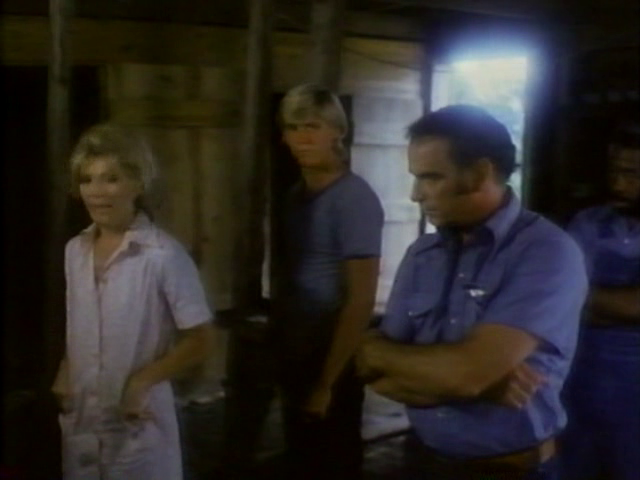
As the pair make their way to an underground tournament, things start to become the sort of insanely-plotted uniqueness that makes exploitation films of the era so fascinating. They, along with their mute assistant (the only black character in the film), stop to bond when someone mentions scars, as dad pulls down his pants to show his son the welts on his ass. Then he falls down a hill.
Meanwhile, mom has an interlude with a friend that she’s told her husband that she’s cheating on him with, presumably because she is insane and the movie needs more melodrama. At the cockfighting arena, a disgruntled little person (Tommy Madden) and a sex-starved teenager attempt to woo the same woman. “The Governor” shows up, played by Claude Kirk Jr., the former governor of Florida, talks about how great cockfighting is, as tells the little person, “I suppose being a dwarf has its mysteries.” The arena owner complains to him about the IRS, making him leave.
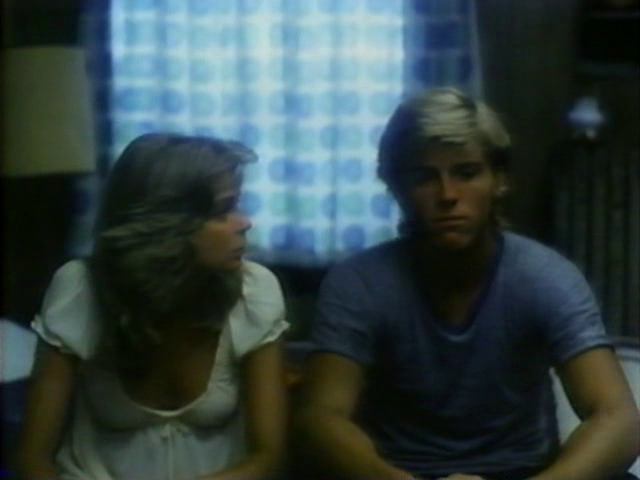
The group of cockfighters end up at a brothel, where Van Patten has a long, stoned conversation with a runaway played by Kristine DeBell, fresh from her X-rated ALICE IN WONDERLAND adventures. Eventually, we do get to the cockfighting, which, as I’ve mentioned, is brutal and terrible and hard to watch, but then the ending itself is so random that I’d hate to spoil it.
As deplorable as cockfighting is, at least ROOSTER is an interesting movie with something to say, even if I have no clue what the hell it is. SUPERCOCK, however, has a bunch of dick jokes. It’s a tough call.
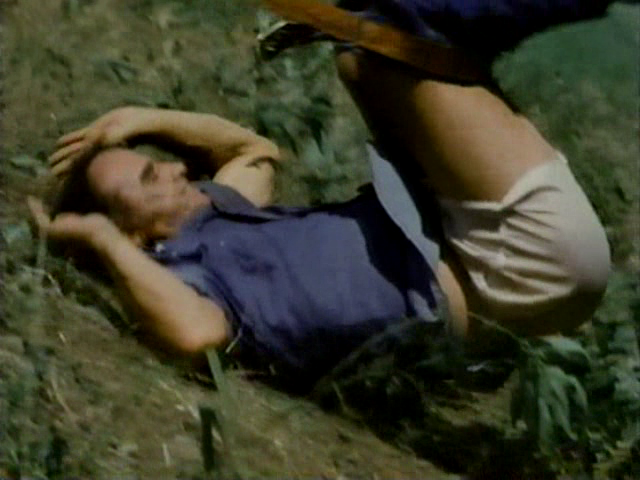
Both films are rated PG. Think about that any time someone thinks we’ve become more lenient in what we think is safe for kids to watch.
4. BY THE SWORD (1991)
FENCING
Fencing, distinct from sword fighting, is one of those sports that you see occasionally in movies (THEATER OF BLOOD, memorably) but is rarely the central focus. The exception? BY THE SWORD, an enigmatic little character drama centered around a fencing school.
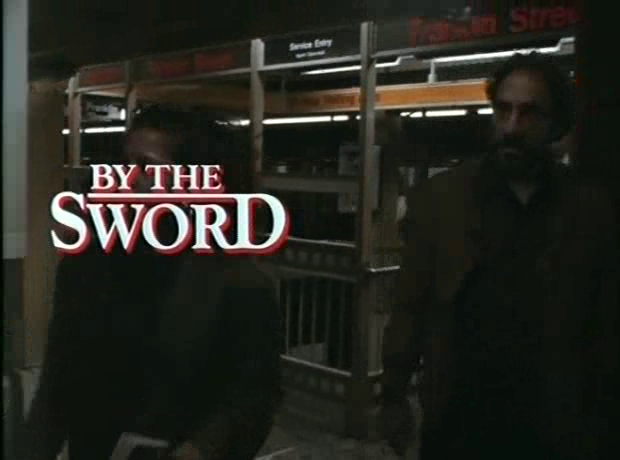
By all accounts, BY THE SWORD looks like a direct-to-video production, as the 1991-shot film stars the likes of Eric Roberts, F. Murray Abraham and Mia Sara. But it’s a fairly highly-pedigreed affair, and the last theatrical film to date of Jeremy Kagan, the underrated director of THE BIG FIX, THE JOURNEY OF NATTY GANN and the baseball-themed THE CHOSEN. It may have sat on the shelf for two years before being dumped to video here in the United States, but it’s probably the most genuinely good films in the list, thanks to solid cast and a unique subject matter.
Abraham plays Suba, a mysterious character haunted by poorly green-screened dreams of a childhood incident involving knights. Suba shows up at the fencing studio of maestro Villard (Roberts) in order to work as a teacher, but finds his skills lackluster and is hired as a locker room attendant instead. Meanwhile, student Jim (Christopher Rydell) aims for going to the fencing championships, impeding his forming relationship with a less-talented student, played by Mia Sara.

While a bit too much time is spent on the cocky Jim (a story arc that ends up unresolved), the chunks of the film involving Suba are a pleasant surprise. Suba slowly works his way into Villard’s graces while revealing his sordid history to a woman he meets in a grocery store, and thanks to steady direction and a humbly subtle performance by Abraham, his tale is a compelling one.
It helps that fencing is one of the more interesting-to-watch sports, even if, according to fencing experts on the IMDb comments, their techniques are off. It certainly borders on ridiculousness at times, as when Suba directs a group of fencers, via music montage, through a choreographed dance number (!), but most of the film is well-made enough that you can excuse a few moments of silliness.
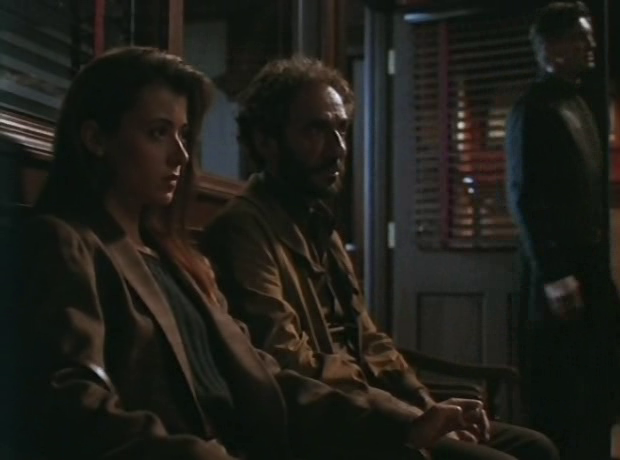
Roberts is a bit on autopilot, but as his character is a bit of cypher anyway, it doesn’t matter, especially since it’s clearly Abraham’s film. And unless Darren Aronofsky suddenly takes an interest in the sport, this is probably the best film about fencing that will ever be made.
3. TILT (1977)
PINBALL
Is pinball a sport? Bowling’s a sport, and it’s essentially the same thing — you roll a ball down a path and try to hit stuff for points. I’m calling pinball a sport. That was I can include the independently-made, Texas-lensed TILT, an epic-length (at nearly two hours) ’70s sleazy, inspirational pinball opus starring Brooke Shields, the big-box VHS of which is one of my most prized possessions.
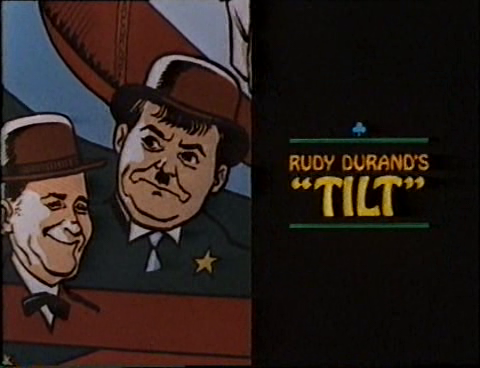
Our story begins with Neil, a pinball hustler (KRULL’s Ken Marshall, the Patrick Swayze of his time) and his weaselly buddy (John Crawford) trying to win a game against The Whale, played by a constantly eating Charles Durning, who’s constantly shot in perspectives to make him look even larger than he already is. Even flies buzz around him! Their cheating ways are found out, and they decide to go to L.A. to pursue a music career(!?) where they meet the title character, a jailbait pinball wizard played by Shields.
She’s called Tilt because she never tilts. (“Nothin’ in life makes sense,” explains the sole black character, er, Jamaica, when asked for an explanation) When Neil realizes his career is going nowhere (no big surprise, really–his music consists entirely of awful love ballads that would make Neil Diamond choke), he dumps the weasely guy and teams up with Tilt.
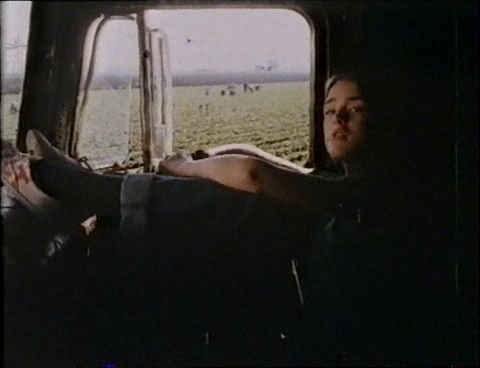
The two begin pinball hustling across the nation, culminating in, you guessed it, a re-match with The Whale.
In between all the pinball footage, lousy music and lag time, there’s bit parts by Geoffrey Lewis (truck driver who throws Tilt out after she suggests that she sleep with his wife(!)), Fred Ward (hustle victim) and Don Stroud. There’s even an annoying stuttering character named Replay, and Tilt has pants that say “Pinball Champ” across the ass.
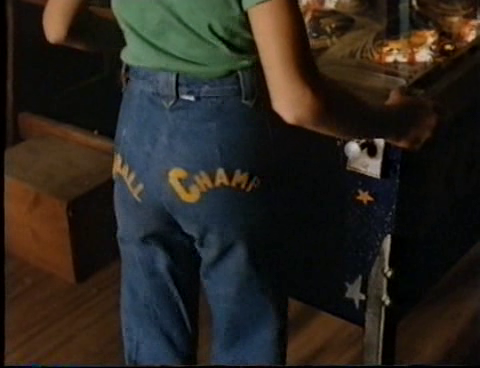
Rudy Durand wrote, directed and produced this piece of work (and credits bill the title as “RUDY DURAND’S TILT,” as though we should all know who the hell he is., but the screenplay was co-written with Donald Cammell, the director of PERFORMANCE, WILD SIDE and WHITE OF THE EYE (which are all recommended to varied degrees). The producers obviously saved money by using the same music over and over until you want to personally strangle the band playing “Pinball… that’s all.”
TILT is the WHITE MEN CAN’T JUMP of pinball movies, but pinball fetishists might make it through the running time — at least there are some behind-the-ball POV shots in order to make watching pinball at least vaguely interesting. Where is writer/director/producer/musical director Rudy Durand today? The world awaits his follow-up, perhaps an epic Skee-Ball flick starring Amanda Bynes. Until then, at least he can say “I told you so” to all the naysayers who thought he couldn’t make his 11-years-in-the-making masterpiece, as you can find out about in a 1979 interview with him here.
2. WHITE FURY (1990)
SNOWBOARDING
WHITE FURY isn’t exactly a snowboarding movie. There is a lot of snowboarding in it, starting with the absurdly long opening scene, in which our ponytailed lead (Sean Holton) boards his way to being named the winner of a vague snowboarding competition. (Though, to be fair, it’s pretty clear that Holton is nowhere near the slopes at the time, as we only see his face in close-up, which is especially odd as Holton is a stuntman.) Much of the movie is more of a hostage drama, as a pair of psychotic bank robbers kidnap our champion and his friends, though, naturally, his snowboarding skills help out in the first of a half-dozen climaxes.
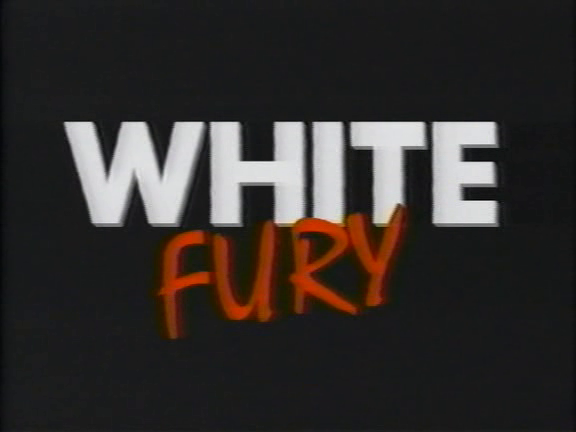
What makes WHITE FURY worth mentioning is that it’s directed by David A. Prior, the direct-to-video action Ed Wood behind the likes of DEADLY PREY and MANKILLERS. While WHITE FURY isn’t quite as nuts as those classics, it’s full of performances that are either over-the-top or barely present, nonsensical plot twists and ridiculous dialogue like “I’m not a kid, Mister Bounty Hunter. I’m a man.” Also, the occasional several minutes in a row of snowboarding footage.
The highlight of the film is Deke Anderson’s hilariously unhinged portrayal of the lead bad guy Tyler, who not only robs banks but slaughters everyone in them for no particular reason. It’s also mentioned that he’s a rapist, I guess just so you’re sure that he’s not supposed to be the guy you root for. As is AIP tradition, Tyler dies about eleventy times, and, also in AIP tradition, there is a rocket launcher involved.
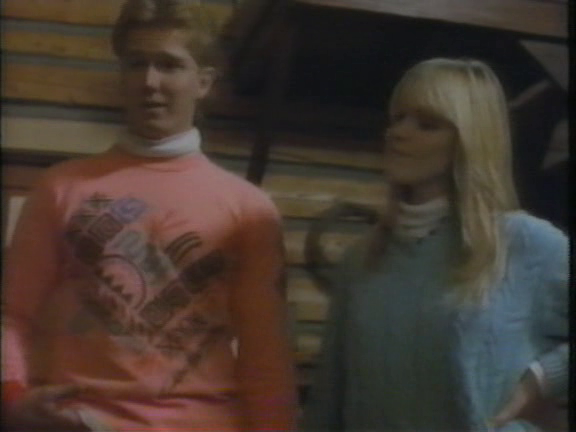 It’s not like the “good guy” characters are really saints either, as when one girl turns out to be a bit of a turncoat, the rest of them dismiss her (inevitable) death as “She had it coming.” I suppose you could admire their cleverness, but they mostly end up escaping situations only because their captors are complete morons.
It’s not like the “good guy” characters are really saints either, as when one girl turns out to be a bit of a turncoat, the rest of them dismiss her (inevitable) death as “She had it coming.” I suppose you could admire their cleverness, but they mostly end up escaping situations only because their captors are complete morons.
Of course, for the purposes of this list, it’s all about the snowboarding. And WHITE FURY can teach you that a good snowboarder can easily out-shoot a guy on a snowmobile and save the day, all while wearing a Cosby Sweater that Claire Huxtable picked out.
1. LONGSHOT (1981)
FOOSBALL
Linda Manz only made a handful of films after her great debut performance in 1978’s DAYS OF HEAVEN before essentially disappearing from the field, re-emerging for the first time in a decade and a half in Harmony Korine’s GUMMO, of all things. Why’d she leave the business? It could have something to do with her final American film, 1981’s inspirational teen foosball flick LONGSHOT.
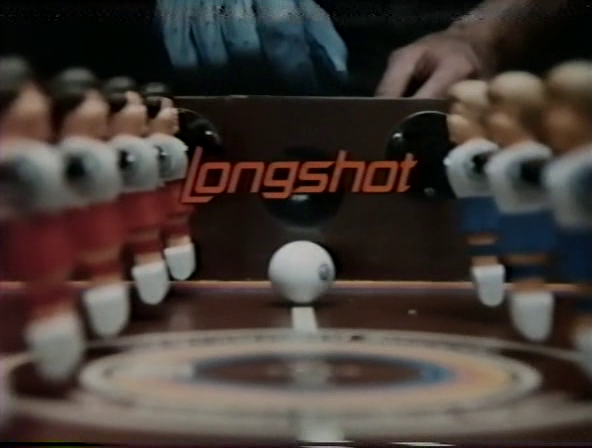
Now, I know foosball as a sport has a following, and there are foosball devotees, but the idea that there was a period in time where a producer could fully back a film about a kid attempting to win the foosball world championships is mind-boggling. But prolific TV-movie director E.W. Swackhamer (of the James Coburn miniseries THE DAIN CURSE) made a rare foray into theatrical film with this flick, featuring a star turn by Leif Garrett, two years after the teen idol’s car accident put a damper on his fledgling career.
Garrett plays Paul, a soccer player who wants to get to Europe in order to play pro, which he thinks he can get by winning the world foosball championships – never mind that it seems to be a completely different skill set that doesn’t even utilize the same limbs. When his goalie/best pal Leroy (Ralph Seymour, the beach junkie in FLETCH!) injures his hand, he finds a spare teammate in the form of the tomboyish Max (Manz), and the three decide to make their way to Vegas for the big championship.
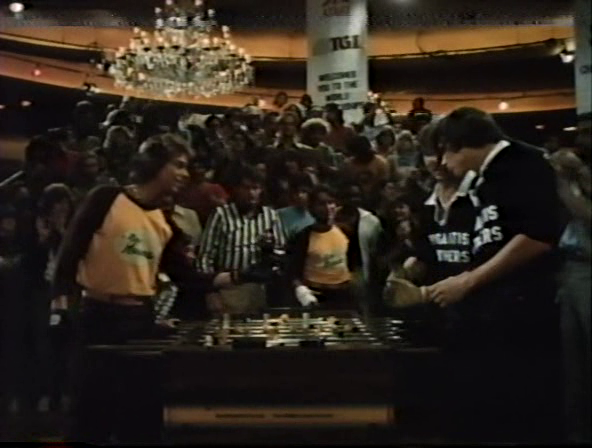
Things get complicated with the arrival of pretty French rich girl Marie-Christine (Zöe Chauveau), whom Paul falls for, much to the chagrin of Leroy and Max. While the lead couple have cute dating montages at closed carnivals featuring the background music crooning “Summer of Love,” Max gets jealous and Leroy gets worried. After the foursome takes off, there’s further issues when Max and Marie-Christine’s parents worriedly try to track them down, despite the efforts of Paul’s keeper or manservant or whatever the hell character vet Ferdy Mayne is supposed to be playing.
It’s always great to see Manz, and there’s even a reference to her role in OUT OF THE BLUE as Paul remarks, “The only person she has a crush on is Johnny Rotten.” Manz’s energetic performance, however, isn’t given a whole lot of support, and much of the film is mostly relationship drama with only occasional returns to the fascinating land of foosball culture.
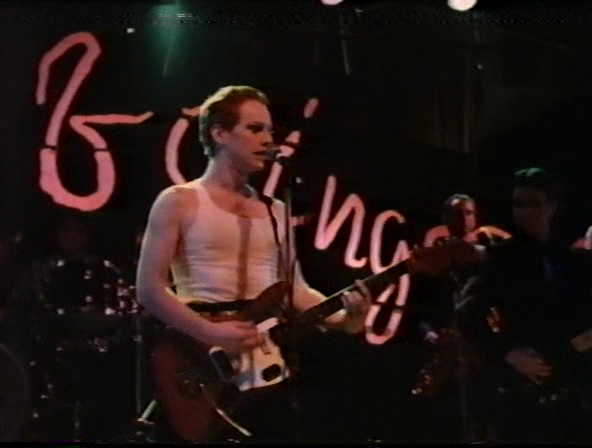
The film even has the time to have group go to see two different live acts – first Brian Wild (who would later provide the great track “Soldier” in SNAKE EATER) and later, Oingo Boingo! The latter band performs “I Want to be Entertained”(and their lead singer, entertainingly, is billed as “Daniel Elfman”) as the group has their relationship drama, with Manz dressed in a tuxedo. The film also has a memorably catchy title song by Marie Cain that plays during the opening credits, the closing credits, and any other place where they didn’t have music to fill the space.
It all climaxes with an amazing goal shot from the opposite end of the field, rendered in beautiful slo-mo. While LONGSHOT may skimp on training montages, it delivers in an absurd finale, and the sport wouldn’t find a media outlet this excitement-packed until the foosball vendetta episode of “Community” three decades later.
@Paul Freitag-Fey
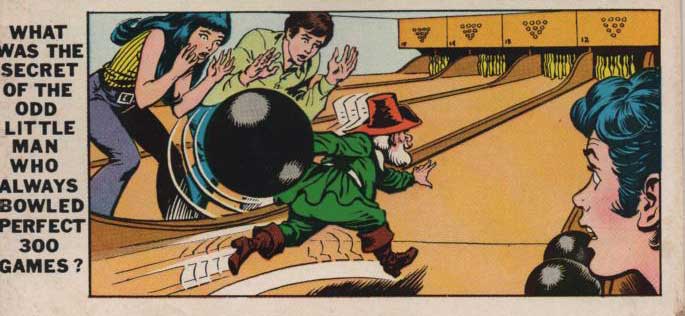
- [THE BIG QUESTION] WHAT’S YOUR FAVORITE FEMALE ENSEMBLE IN MOVIES? - July 22, 2016
- [IN THEATERS NOW] THE BOY (2016) - January 24, 2016
- Cult Movie Mania Releases Lucio Fulci Limited Edition VHS Sets - January 5, 2016
Tags: bowling, david a. prior, fencing, foosball, pinball, snooker, snowboarding, sports, tennis, top 10, track and field, volleyball

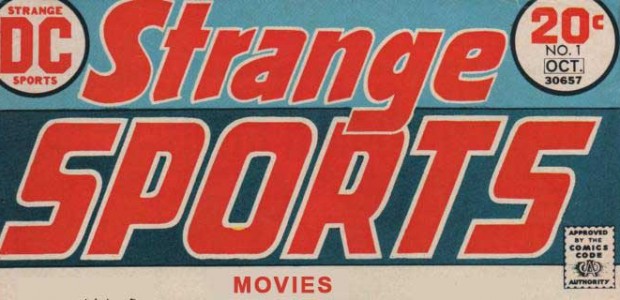




What is odd is that Racquet has bona fide tennis legend Bobby Riggs and Lynda Day George who played fictional tennis legend Mary Riggs in Pieces.